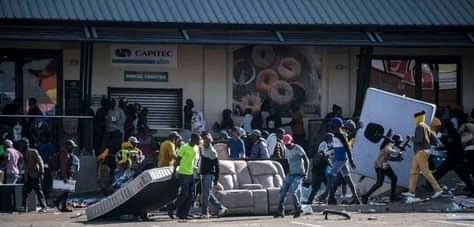By: Ukachuchwu Okorie
The government of Cyril Ramaphosa has made progress in restoring law and order following the Zuma insurrection in Kwazulu Natal and Gauteng provinces.
The conflagration in South Africa started on 29 June 2021, when former president, Jacob Zuma was sentenced to 15 months in prison for contempt of court, after refusing to appear at a commission investigating allegations of corruption during his time in office.
On 9 July 2021, KwaZulu-Natal’s high court maintained Jacob Zuma’s conviction and prison sentence, sparking unrest. Ever since, there have been widespread reports of looting, public violence, burglary, malicious damage to property in parts of KwaZulu-Natal and Guateng. AfricaWorld learnt that over 200 are dead including a 14 year old who was shot at the back of his head while more than 2000 have been locked up. As a result, 25,000 South African National Defence Forces (SANDF) were deployed in Gauteng and KwaZulu-Natal, as part of Operation Prosper to restore normalcy.
“I stole a few things like cold drinks and electrical stuff as well as paint”, Sello Marakai, a looter confessed to online news agency Wion. Another looter named Sibongiseni Hlongwane informed that he joined the looting spree because others were doing the same and they won’t have anything to eat if the shops are looted. Many have blamed illiteracy and the wide inequality in the former apartheid enclave. Even though power returned back to the black majority in 1994, the economy has remained in the hands of minority whites. Unfortunately, a new black elite emerging from the ruling African National Congress (ANC), of which Jacob Zuma belonged to, has disappointed. They have been corrupt, less inspiring and tactless in ushering a new hope, which the end of apartheid promised.
The trouble with former president Jacob Zuma started when he was charged with corruption in March 2018, mainly in connection with the South African Arms Deal, known as the “Strategic Defence Package” worth R30 billion rand.
One of the flashpoints leading to his troubles and eventual fall from power, was the relationship between the Zumas and the Guptas, three Indian-born brothers who moved to South Africa after the fall of apartheid.
The Guptas ran a portfolio of companies that enjoyed mouth-watering contracts with government departments and state-owned conglomerates. Unfortunately, the Guptas equally employed Zuma family members like the president’s son, Duduzane, who was a top executive. Infact, the Jacob Zuma corruption epitomize the squandering of the post apartheid grace and goodwill started by Nelson Mandela.
Even though the political navigation to empower indigenes seem tough, the bickering, backbiting and corruption among top cadres of the ANC has marred the momentum ushered in by Madiba. President Cyril Ramaphosa, who was Zuma’s deputy, is not free from accusation of corruption. However, he seems to be in the good books of those who are hell-bent on disgracing Jacob Zuma.
Although Jacob Zuma’s jailing has triggered the breakdown of law and order, and massive looting, there are more to the issue on ground.
There is a need to address the issue of education, land, economic gap and Zuma’s 15 months jailing. Yes, Jacob Zuma must pay if he stole, but the ANC since the exit of Madiba keep losing their grip on power over vices especially abandoning indigenous blacks.
Ukachuchwu Okorie is Editor-in-Chief


